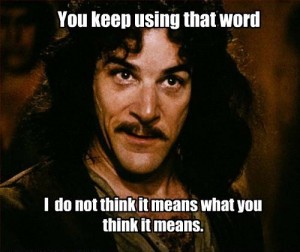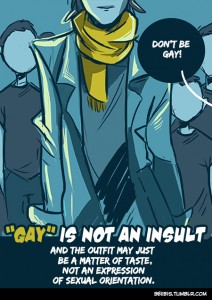Imagine a man shooting bullets in the dark. It’s pitch black – the man can’t see who might be around him. The room is clearly packed with people, judging by the noise. Yet, the man continues shooting.
A scenario like that is unlikely but not uncommon – we hurt people in crowded rooms every other day. We blindly use the ammunition of words. To quote Patrick Rothfuss, “Words can light fires in the minds of men. Words can wring tears from the hardest hearts.” Using hurtful words can wound, true, but so can using words out of context. We destroy their meaning and take away their real significance.
Statutory Warning: This isn’t a hard-handed judgement about your use of vocabulary, neither is it a dictation of how you should speak; it’s a gentle request to be careful with your word [slang]s.
This struck me the day after this year’s FIFA World Cup Brazil-Germany match (you know which one). I heard a friend exclaim,” Germany totally raped Brazil!” That got me thinking about the many words we use heedlessly, every day:
Dude, you raped his case!: According to WHO, 35% of women worldwide have experienced a form of sexual violence at some point in their life. It’s a vastly under reported crime and men aren’t exempt from it. So you’re unlikely to know if the person you’re talking to, or anyone in the vicinity, has been a victim of molestation or rape. You cannot possibly relate to the emotional suffering of being forced upon sexually, so maybe be sensitive to it?
 Okay – Just imagine being made to do something you hate doing, multiply that feeling infinitely, and you may gain some insight into what a rape victim has experienced. Not only may you force them to relive the trauma, but you may also reduce the severity of the word. It’s not a word you can use offhandedly, in everyday conversation.
Okay – Just imagine being made to do something you hate doing, multiply that feeling infinitely, and you may gain some insight into what a rape victim has experienced. Not only may you force them to relive the trauma, but you may also reduce the severity of the word. It’s not a word you can use offhandedly, in everyday conversation.
I swear, she is such a B*t*h/Sl*t: Guys, if you want to hurl abuse, at least, do it right! Firstly, don’t confuse the two. The first is the female equivalent of a dog [a woman who can speak her mind, or has the capability to lead, is not automatically a b*t*h].
The second is a woman who has had sexual relations with many people.
Secondly, bypassing the ‘who anyone sleeps with is no one’s business’ bit, a woman with many male friends, or a woman who isn’t into long term commitment, isn’t a sl*t. In the case of men, the same goes for the term ‘manwh*re’.
She’s so OCD/Depressed/Anorexic!: When it comes to mental illness, it’s common to see terms thrown around without any awareness of the depth of their meaning. ‘Depression’ is not a bad day, born out of boredom of lack of motivation; it’s a mental disorder which affects the chemical balance of the brain.
Similarly, OCD (obsessive compulsive disorder) doesn’t refer the persistent need for cleanliness, it’s an illness characterized by illogical but overpowering obsessions that can take over a person’s life. An anorexic person is not thin, but someone suffering from a psychological disorder that doesn’t allow them to eat well [Guys, keep an eye out for this one]. All of these, and more, are recognized by the medical community and require therapy and/or drugs to deal with them.
By throwing these words around, we invalidate their suffering, and may prevent sufferers from seeking help, or, conversely, cause undue worry over normal behaviour. A special mention must be made for the word ‘retarded’, which is used for developmental challenges, but now functions as a slang word for ‘idiotic’. By using it this way, you imply that all intellectually disabled people are inherently idiots, rather than subject to a medical condition [If you think that, sorry, but you’re an idiot!].
Please take that shirt off. It’s so gay: Gay started out in the 20th century as a word for ‘happy’, before being used as a synonym for homosexuality in this one. Yet it’s common to hear it used as a substitute for words such as ‘eccentric’, or in reference to a man doing or wearing anything remotely ‘feminine’.
Contrary to popular opinion, cooking and sewing, while fairly useful, are not solely limited to gay men. Scarves, despite being a very elegant accessory, aren’t a badge to identify homosexuals. Rather than using gay as a personality trait, expand your vocabulary to use the words ‘bizarre’, ‘peculiar’ or ‘wacky.’
This isn’t an issue of political correctness or grammatical errors. It’s a matter of feelings – because words can hurt people even when you don’t realize it (bad grammar hurts me, but that’s an entirely different story). These are just a few words that popped into my mind. Are there any words we carelessly use that bother you? Comment below!



